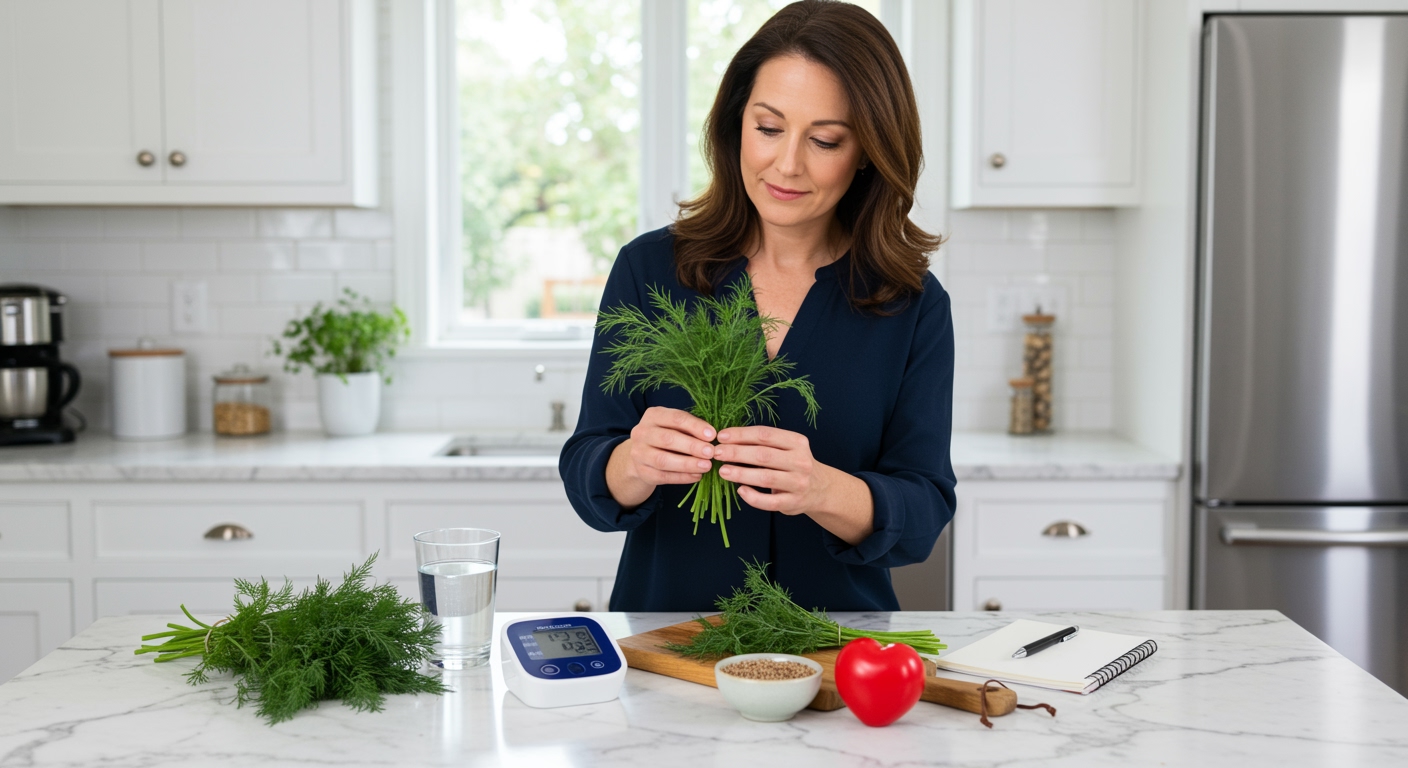✪ Key Takeaway: Dill contains flavonoids and potassium that may help lower blood pressure through vasodilation and sodium regulation.
Introduction
Your doctor just told you that your blood pressure numbers are creeping up, and you are wondering if there are natural ways to bring them down.
You might be asking this question because you have heard conflicting information about herbs and blood pressure, or perhaps you want to explore natural options before considering medication.
Hi, I am Abdur, your nutrition coach, and today I am going to explain how dill might help manage your blood pressure levels and what the science actually says about this common herb.
What Makes Dill Special for Blood Pressure?
Dill contains several bioactive compounds that researchers believe may influence cardiovascular health.
The herb is rich in flavonoids, particularly quercetin and kaempferol, which have demonstrated vasodilatory effects in laboratory studies.
These compounds work by helping blood vessels relax and widen, which can reduce the pressure needed to pump blood through your circulatory system.
Dill also provides a decent amount of potassium, a mineral that plays a crucial role in blood pressure regulation by counteracting the effects of sodium.
The essential oils in dill, including carvone and limonene, may also contribute to its potential cardiovascular benefits through anti-inflammatory pathways.
✪ Fact: Fresh dill contains about 208 mg of potassium per ounce, which is roughly 4% of your daily needs.
Does Research Support Dill for Blood Pressure?
The scientific evidence for dill and blood pressure is limited but promising based on preliminary studies.
Most research has focused on dill extract rather than the whole herb, which makes it difficult to translate findings to everyday consumption.
Animal studies have shown that dill extract can produce modest reductions in both systolic and diastolic blood pressure readings.
However, human clinical trials are scarce, and the few that exist involve small sample sizes and short durations.
The mechanism of action appears to involve calcium channel blocking activity, which helps prevent excessive contraction of blood vessel walls.
While these findings are encouraging, more robust human studies are needed before we can make definitive claims about dill effectiveness for blood pressure management.
✪ Note: Most studies used concentrated dill extracts, not the amounts you would typically consume in food.
How Much Dill Should You Consume?
There is no established therapeutic dose of dill for blood pressure management because human studies are limited.
Most people consume dill as a culinary herb in amounts ranging from one teaspoon to one tablespoon of fresh or dried dill per day.
Fresh dill is generally more potent than dried dill because it retains higher levels of volatile oils and water-soluble compounds.
You can incorporate dill into your diet through salads, soups, fish dishes, yogurt-based sauces, and vegetable preparations.
Dill seeds, which have a stronger flavor than the leaves, can be used as a spice and may contain higher concentrations of certain bioactive compounds.
Remember that consistency matters more than quantity when it comes to getting potential health benefits from herbs and spices.
✪ Pro Tip: Add fresh dill to your meals at the end of cooking to preserve its delicate compounds and maximize potential benefits.
Are There Any Safety Concerns?
Dill is generally safe for most people when consumed in normal culinary amounts.
However, some individuals may experience allergic reactions, particularly those who are sensitive to plants in the carrot family.
Large amounts of dill or concentrated dill supplements could potentially interact with medications, especially blood pressure medications.
If you are taking antihypertensive drugs, adding significant amounts of dill to your diet might enhance their effects and cause blood pressure to drop too low.
Pregnant women should stick to culinary amounts of dill, as larger medicinal doses have not been studied for safety during pregnancy.
Always consult with your healthcare provider before using dill or any herb as a complementary approach to managing blood pressure.
✪ Note: Monitor your blood pressure regularly if you are using dill alongside blood pressure medications.
The Bottom Line
Dill shows promise as a natural approach to supporting healthy blood pressure levels, but the evidence is still developing and should not replace proven treatments.
Herbs work best as part of a comprehensive lifestyle approach, not as magic bullets for complex health conditions.
I would love to hear about your experiences with dill or any questions you might have about natural approaches to blood pressure management in the comments below.
References
At NutritionCrown, we use quality and credible sources to ensure our content is accurate and trustworthy. Below are the sources referenced in creating this article:





